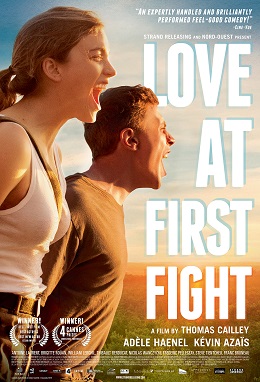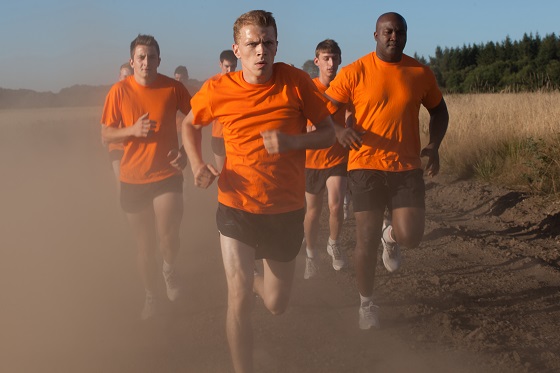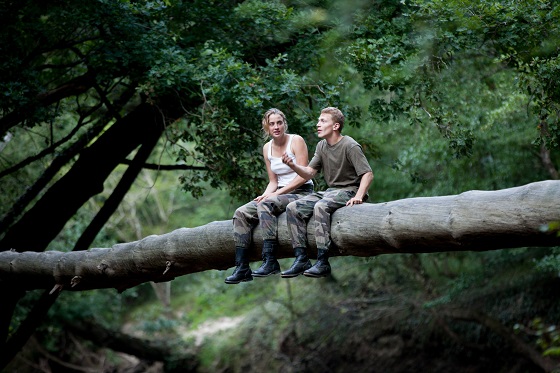Leave it to the French to have balls big enough to take back their own cinematic moves, and while stealing, also make off with America’s cherished rom-com formula. This is like a burglar that breaks into your house to take back the T.V. you stole from them, and pockets a string of pearls on the way out as an inconvenience tax. That’s what it feels like watching Love At First Fight (Les Combattants), director Thomas Cailley’s debut feature about an emotionally unmoored young man and woman in southwestern France. The film goes through all the paces of a traditional boy-meets-girl summer romance dramedy, yet sidesteps tired character tropes and plot contrivances for originality and authenticity. The end result is a superbly acted, beautifully shot, well-paced picture that feels original and familiar all at once.
Love At First Fight opens with Arnaud (Kévin Azaïs) in a funeral parlor with his older brother, Manu (Antoine Laurent). The two are there to negotiate the purchase of a coffin for their recently deceased father, and immediately inform the audience everything they need to know about the basics of their relationship and individual personalities. Outraged at the inferior quality and preposterous cost of the hardware, Manu storms off to build the coffin himself, his sheepish brother following obediently in-tow. The boys inherited a carpentry business from their father, after all, and as the first act gets further underway, it is established that Manu has every intention of keeping the business going.
For his part, Arnaud seems to be taking his father’s death alright, and it is the aimless nature of his life, not the recent loss, that has him somewhat adrift. He gets a summer job working in the family business with his brother, mostly at the urging of his mother, who insists that Arnaud consider his future and start developing long-term goals. In this way, Arnaud is passively floating down the gentle stream of his life when he meets Madeleine (Adèle Haenel), a brooding tomboy who bests Arnaud in an impromptu wresting match arranged by Army recruiters. The sting of embarrassment doesn’t fester, yet as chance would have it, Arnaud and his brother land the contract to build a shed for Madeleine’s parents, which brings the two into regular contact.
In an American film, this would have been the point where the lead would get enchanted by the Manic Pixie Dream Girl, be saved by her sage wisdom, then in turn save her. The tenor and flavor of Love At First Fight lends itself to this expectation, as the wide, silent shots mixed the sometimes loud/sometimes muted wardrobe choices set all this up as your traditional, quirky rom-com, a-la Wes Anderson (French indie flavor) meets Cameron Crowe (Manic Pixie Dream Girl set-up). Yet again, Cailley’s film keeps all of the best components of contemplative, artfully-framed shot selections and ditches all the contrivances associated with the traditional rom-com.
Nowhere is this defiant originality more pronounced than in the character of Madeleine, whose sole obsession is physical fitness and survival training, and whose defining character trait is pessimism (hardly the prototypical Manic Pixie Dream Girl). Madeleine isn’t some kind of ebullient lust-for-life junky with inspiration pouring out of her ears: she’s an unnecessarily angry young woman with a false sense of purpose. Arnaud sees through all this yet still seems drawn to the young woman; for her part, Madeleine couldn’t care less about Arnaud. Madeleine is dead-set on joining the Army in the fall, and is training for an induction prep. course set to start in just a few weeks. To this end, she swims with weights, reads up on survival manuals, and acclimates herself to terrible food by drinking pureed fish. Through all of this, Arnaud sits in the wings building a shed in Madeleine’s backyard, and seems content to be around someone as hopelessly confused about life as he is (even if Madeleine doesn’t realize it).
Now again, in an American film, Madeleine would etch sage wisdoms into Arnaud’s blank slate of a mind, and whatever trauma she was covering up by being so tough would eventually be broken by Arnaud’s purity of spirit. Yet that’s not what happens in real life, with actual people, and it’s not what happens in Love At First Fight. Although she puts up a tough front, Madeleine is just as lost and confused as Arnaud, the only difference being that the latter person is more or less aware of it. As the two make one bad decision after another, and compound mistake upon mistake, the aimless state of both their lives comes into sharper focus for the audience (if not the characters, who clearly need to work through all of this).
The magnificent work of Azaïs and Haenel along with this fresh take on a familiar trope buoys the film through its first two acts, where it takes a number of largely predictable turns. All of this work really pays off in the third act, however, when Love At First Fight blazes its own trail and takes off on a tangent not at all expected. A few of the loose ends that the picture sets up early on don’t really pay off (i.e., Arnaud’s friends, the orphan ferret, the Army training course), either in plot production or symbolic/metaphorical value, yet this can probably be chalked up to a script that needs just a bit more trimming around the edges. Overall, these failings don’t detract from the broader flavor of the picture, which is sweet, yet not at all artificial.
Currently playing at the Seattle International Film Festival, and riding high on the laurels won at Cannes and the Caesars (Adèle Haenel won Best Actress at both), Love at First Fight is a light, interesting, gorgeous, and ultimately successful take on the familiar rom-com standard. Like Arnaud early in the film, if one just lets go, and accepts the will of the film’s current, everything will work out just fine.








Comments on this entry are closed.